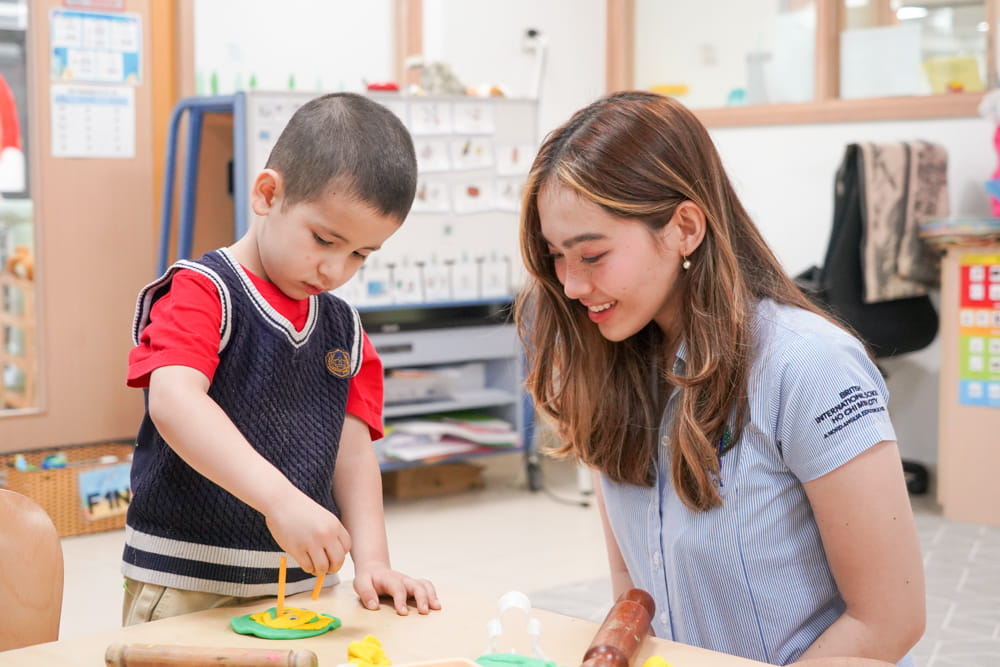At BIS HCMC we are highly committed to the health, wellbeing and happiness of your child. We deliver in school a comprehensive wellbeing curriculum to provide our students with the tools, resources and support to balance their social, physical, emotional and mental health. As part of this, we also look at preventative measures to ensure the safety of our students beyond BIS and equip them with knowledge and skills for both today and their future success in the wider world.
This term we were extremely fortunate to welcome back into school experts from the United States Drug Enforcement Administration (DEA) and the U.S. Consulate General in Ho Chi Minh City’s Regional Security Office (RSO) to discuss more on the topic of drugs and substance abuse with some of our students and parents.

Mr Andrew Truong, a DEA Special Agent from the U.S. Embassy in Hanoi and Mr Byron Bacik, Regional Security Officer from the U.S. Consulate General HCMC gave presentations to students in Years 6, 7, 8, 9 and 12 on Monday 23rd October. Alongside two parent sessions for parents with pre-teens and teenagers, these workshops set the tone for important conversations to be had at home. We are so grateful to be able to collaborate with the U.S. Embassy in Hanoi and the U.S. Consulate General in HCMC so all of our community can benefit from the expertise of the Drug Enforcement Administration (DEA). The DEA works both in the United States and internationally in 69 countries, by combating criminal drug networks, tracking current drug trends and offering a wide range of community outreach programmes such as this.
Adjusted for the age group, our students learned about different kinds of common drugs and their effects on the body, including cocaine, marijuana, heroin and methamphetamines. Both students and parents also learned about the changing trends, including the “gateway drug” of today, prescription pills which have led many to abuse other heavier drugs with sometimes lethal consequences. Common prescription pills that are often abused include Adderall, Xanax and oxycodone. This is especially important to be aware of, as an alarming number of counterfeit prescription pills containing fentanyl, with a fatal dose of as little as 2mg, has saturated the illicit drug market. Mr Truong highlighted that many legal prescription drugs are easily accessible in home medicine cabinets and urged parents to discard of pills that are no longer needed. While Mr Truong noted that as of now it’s not being seen in Vietnam, it is something to be aware of in the future as students continue on their lives many of which will include living abroad for college and their careers.

During the sessions, a sea of hands were raised by curious students who wanted to know more about what it was like to work at the DEA as an agent or forensic scientist. Students learned about the different career opportunities at the DEA in addition to special agent positions, specifically forensic science positions. Forensic scientists play a critical role at the DEA analysing seized drugs.

Why have these conversations and why now?
Alongside a multitude of resources, one of the most valuable was the support networks of the students. As a school, we give our students the resources, tools, knowledge and confidence on this topic so that they can make good choices in the future. In the age of information and the internet, children will have ready access to information about drugs, but we cannot control the reliability of these sources. The best thing we can do for our children is to be informed and open these conversations both at school and in the home.
It is equally important to have these conversations early, so that when they do go out into the world and go off to university they will already have built these foundational values to make the right choices. Studies have shown that pre-teens will engage more with this kind of discussion before their autonomous teenage years - and this was absolutely the case with our Year 6 and 7 students, who were considerably more engaged in the conversation during our sessions.
So, we encourage parents to start this discussion at home. While it may not be perfect the first time around, having open communication builds honesty and trust between parent and child.
Mr Truong also shared some tips and tricks to navigate these difficult conversations:
- Stay neutral, don’t react with anger if your child opens up, this will only discourage them from communicating with you again about this in the future.
- Use language that they understand.
- Explain WHY you don’t want them to use drugs, focus on their goals and future and make it clear that you want the best for them, rather than simply saying NO without any further discussion. Help them understand the consequences for themselves.
- Don’t expect it to be a perfect conversation the first time, it could be awkward and that’s fine, it’s all about building the foundation.
- Don’t make stuff up and make sure you are informed on the topic. If you share incorrect information it may create a lack of trust.
We want to say a huge thank you to Mr Andrew Truong and Mr Byron Bacik for spending the day to share their expertise and advice with us on this very important topic.
If you would like to learn more please review the following resources from the U.S. government:
https://www.getsmartaboutdrugs.gov/
https://www.justthinktwice.gov/
https://www.campusdrugprevention.gov/


/chantal-author/selected-photo-(8).jpg?h=2122&iar=0&w=2122&rev=502bc73289a74a0684eddcbc18675d51&hash=CB3084D6B73F331A4C6EE83B00272DB3)






